Business in Honduras, Tegucigalpa, Manufacturing

Honduran Economy and Foreign Trade. Business in Tegucigalpa, San Pedro de Sula. Textiles
- Introduction to the Republic of Honduras (Central America)
- Honduran Economy
- International of Honduras
- Investment in Honduras
- Business in Tegucigalpa and San Pedro de Sula
- Case Study: Business Opportunities in Honduras;
- Manufacturing
- Textile
- Agribusiness
- Services
- Access to the Honduran Market
- Business Plan for Honduras
The objectives of the subject “International Trade and Business in Honduras” are the following:
- To analyze the Honduran Economy and Global Trade
- To know the trade opportunities in Honduras
- To explore the Honduran trade relations with the country of the student
- To know the Honduran Trade Agreements
- To develop a business plan for the Honduran Market

The Subject “Foreign Trade and Business in Honduras” belongs to the following Online Programs taught by EENI Global Business School:
Masters: International Business, Foreign Trade.
Doctorate: American Business, World Trade.

Languages:  or
or  Honduras
Honduras  Honduras
Honduras  Honduras.
Honduras.
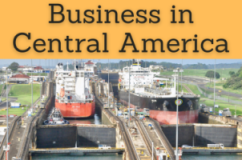
- Credits of the subject “Doing Business in Honduras”: 1

- Duration: one week
International Trade and Business in Honduras.

Honduran Trade Agreements and Market Access.
- Honduras and the Latin American Economic Area
- Central American Integration System
- Central American Common Market - Integrated with the SICA -
- Association of Caribbean States
- Mesoamerica Project
- Latin American and Caribbean Economic System
- ALBA
- The Honduran products and services has direct access to many international markets thanks to the Trade Agreements with Japan, the EU, Chile, or Australia
- UK-Central America Free Trade and Economic Integration Agreement
- Dominican Republic-Central America
- Dominican Republic-Central America-U.S. Agreement
- Colombia-Northern Triangle Agreement
- Mexico-Central America Agreement
- El Salvador-Honduras-Taiwan Agreement
- Peru-Honduras Agreement
- Panama-Honduras Agreement
- Canada-Honduras Agreement
- South Korea-Central America Agreement
- ALADI (observer)

- WTO
- WCO
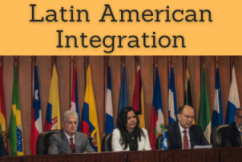
- ECLAC
- Inter-American Development Bank
- OAS
- CELAC

- UN
- WB
- WTO
- IMF
- Since 1980 Honduras is governed by a democratic system with steady institutions, a transparent legal system, and political and social stability
- Honduras is situated in the heart of the American continent. Only two hours by Air and 48 to 72 hours by sea to the U.S.
- Honduras has a population of 8.7 million people
- Honduran Capital: Tegucigalpa
- Area of Honduras: 112,492 km²
- Honduras shares borders with Guatemala, El Salvador, and Nicaragua
- Honduran main language: Spanish
- Honduras gained the independence from Spain in 1821
- Abolition of Slavery in Honduras: 1824
- African Diaspora in Honduras: 0.1 million people (2% of the Honduran population)
The main religion in Honduras: Christianity - Catholicism (7 million) and Protestantism (1 million).

Honduras belongs to the Latin American Economic area of the Western Civilization.
Global Trade and Business in Honduras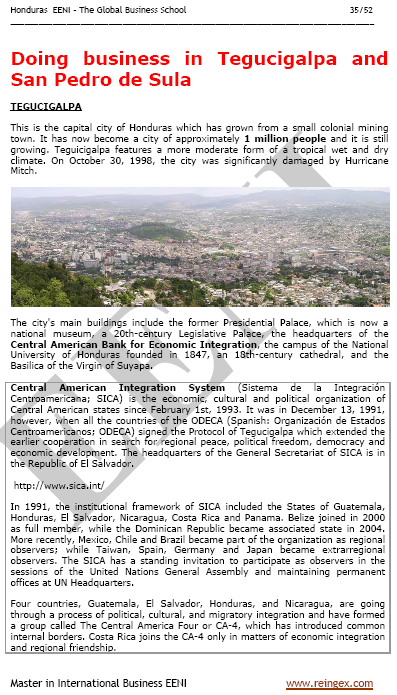
Honduran Economy.
- The Republic of Honduras is an interesting place to do business in Central America
- Honduras is near the production centers of North America and the largest markets in the World
- In the last years, 300 companies have established their operations in Honduras (America) under “maquila” - (manufacturing and light assembly) in sectors such as textile and apparel, agro-industry, automotive components, electronics, and furniture production
- Honduras is the hub of the Central American garment industry
- Honduras serves as a distribution platform to the Central American markets, among the lowest Logistics costs in the region
- The main Honduran economic activities are the financial services, communications, manufacturing, trade, agriculture, livestock, forestry, and fisheries
- Agribusiness represents 40% of the GDP of Honduras
- Honduran Currency: Lempira
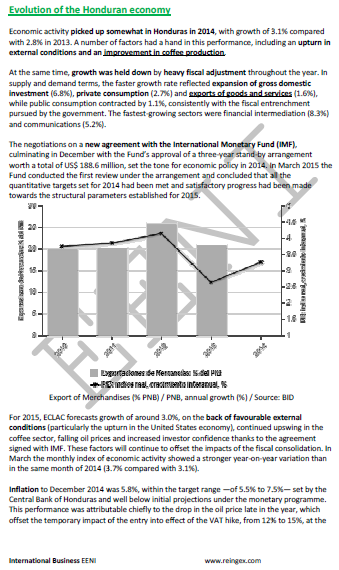
Emerging Sectors in Honduras:
- Traditional sectors (agriculture, textiles, tourism)
- Value-added industries (agribusiness, sustainable tourism, light manufacturing, and business services)
- A flexible manufacturing sector, capable of exporting in varying scales, supported by a favorable tax and customs code
- A growing services sector
- A tourism sector that attracts international travelers
- A forestry industry that supplies a broad variety of non-traditional wood species 32 million hectares (80 million acres) at highly competitive prices, with different climates and a large potential for low irrigation agriculture
Main business opportunities in Honduras:
- Traditional sectors: agriculture, textiles, and tourism
- Value-added industries: agribusiness, sustainable tourism, light manufacturing, and business services
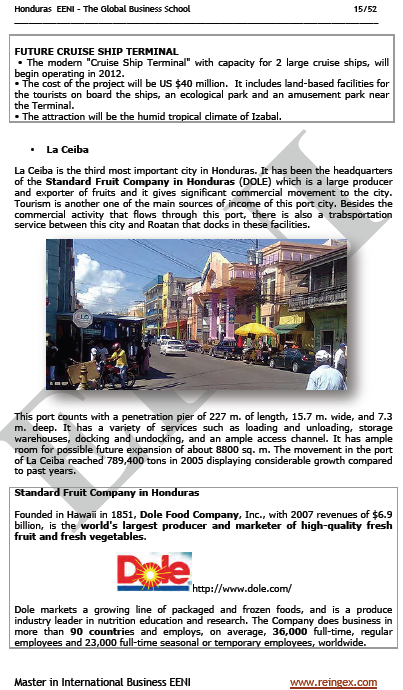

International Trade of Honduras.
- Exports of the Republic of Honduras are led by the activities related to the maquilas
- Total Honduran exports grew by 7.2%
- Honduras is the third largest apparel exporter to the U.S. market
- The main Honduran export markets are the U.S., the EU, El Salvador, Guatemala, and Mexico
- The largest importers from Honduras are the U.S., Guatemala, El Salvador, the EU, and Costa Rica
- Puerto Cortés is the only deep-water port in Central America; is engaged (busiest) among the Honduran and Central American ports
- The Inter-oceanic Highway construction will allow the communication by road between the Atlantic and the Pacific oceans
- Any part of Honduras can be an Industrial Processing Zone/Free Zone where companies are exempt from all taxes
FIDE Investment and exports is a Honduran private non-profit organization that works in partnership with the Government and other private agencies to improve the business climate in Honduras and promote the foreign direct investment.
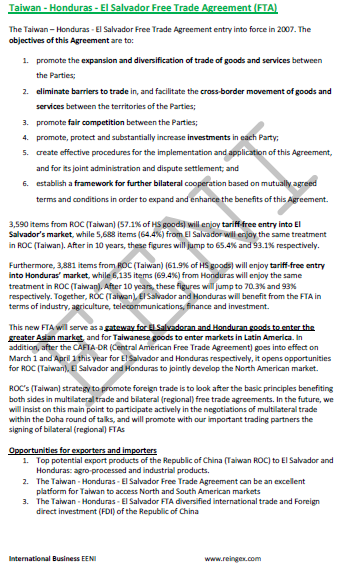
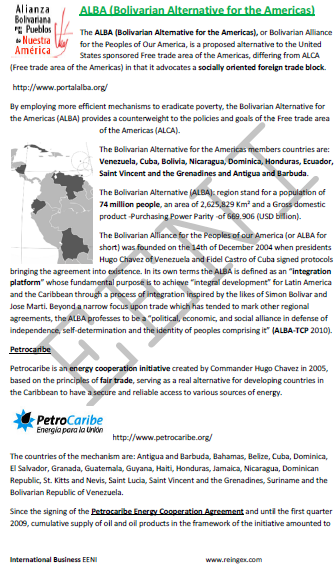
(c) EENI Global Business School (1995-2024)
We do not use cookies
Top of this page


